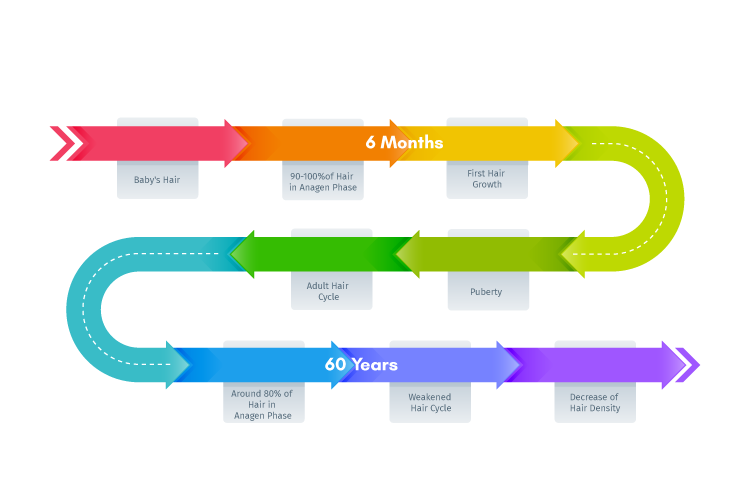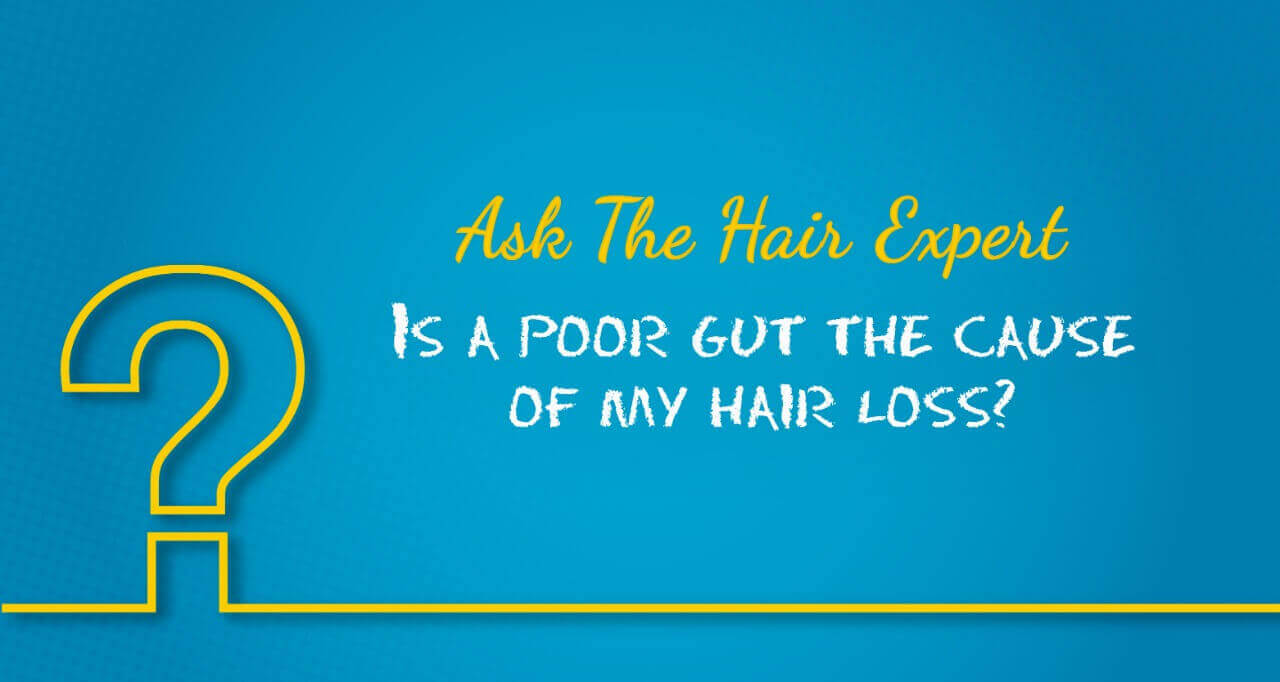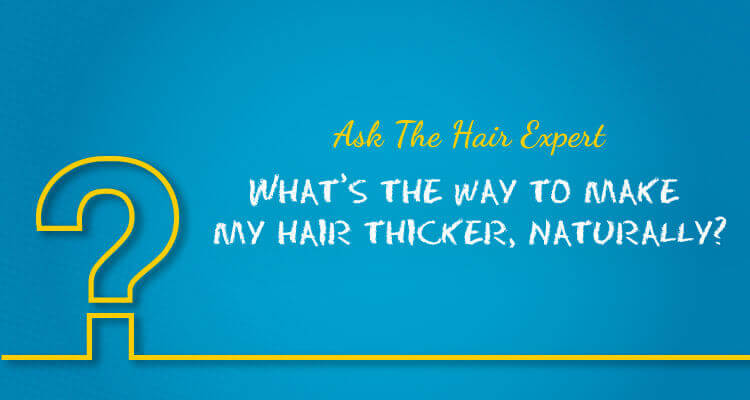If you are a teenager and notice your hair falling, do not panic. If you are a new mom and wake up to hair on your pillow, take it easy. You are not going bald. Your hair is simply reacting to hormonal changes in your body.
A Trichologist can never stress enough on how tied up your hair is to the general state of your health. The first question any patient will be asked when he or she visits a Trichologist is pertaining to the general state of his or her health. How your body is functioning inside, every organ and gland is closely linked to your hair. Trichology and general medicine are very closely linked.
Today, let us discuss your hormones and your hair. One of the internal imbalances that often result in hair loss is a hormonal imbalance.
You may have read our blog last month on DHT – the debilitating hormone that attacks your hair. Today, we will elaborate and understand further, on how hormones at large affects hair, throughout your lifetime.
As we always recommend – understand the root cause to some of your seemingly mundane hair concerns first. Sometimes it may be a natural bodily function that you will tide over. Sometimes, it could be something that requires your intervention. When you understand your inner mechanics, you are that much more prepared to handle it right.
Hormones are an integral part of our system. And impacts multiple functions that you take for granted. Every part of your body, be it your brain, heart, kidneys or skin – each has a well-defined part to play. All of them take their direction from your endocrine system. And all of this happens through hormones. Did you know that?
Let’s delve deeper…
What are Hormones?
Hormones originate from the endocrine system. Endocrine system refers to the collection of glands that produce and control your hormones. These hormones regulate your metabolism, your growth & development, your tissue function to sexual function, the reproduction function, your sleep, and your mood, among other things!
It is often referred to as the chemical messenger system that comprises feedback loops of the hormones released by your internal glands (your thyroid gland and the adrenal glands being the most prominent), directly into the circulatory system, thereby regulating target organs across your body. Thus, hormones are your body’s chemical messengers that travel through your bloodstream and get your organs to do their work. It is thus very clear that hormones are vital for your well being!
Understand hormonal imbalance
A commonly used term which we are sure you have come across. Sometimes, these essential hormones go out of balance. And when they do, there are implications across the organs. You may gain or lose weight, get diabetes, bones may become weak and yes, you may lose hair!
And as with most situations concerning your body’s inner functioning, your hair will signal out the concern first. Hair is our body’s barometer that indicates your good health or the lack of it. Thus, if your hormones go out of balance, your hair will be the first indicator of trouble.
How do hormones affect your hair?
There are two factors that affect your hair growth cycle through your lifetime – Age & Hormones.
If you haven’t already, do read up on hair growth cycle and hair anatomy, to understand this better. As you may recall from our pages, every hair has its own growth cycle that it follows – through three phases of growth (Anagen), transition (catagen) and fall (telogen).
This hair growth cycle is greatly influenced by the hormones. Just as how the hormones travel through the bloodstream to various parts of the body, they travel to the roots of your hair, which then captures your hormone’s signal and reacts on it.
Further, there are 2 types of hormones on the basis of your gender: male or androgenic hormones, including testosterone, and female or estrogen hormones such as progesterone. These hormones play a different role in your body and particularly in the hair cycle.
During puberty when large amounts of these hormones arrive in the bloodstream, the hair strands begin to change in terms of their cycle. And these hormones change their behaviour over one’s lifetime – every time affecting your hair in a particular way.
The female hormones – estrogen – participate in the hair growth journey by slowing down growth and prolonging the anagen phase. Inversely, male or androgenic hormones accelerate the hair cycle. However when discussing hair loss and androgens, it is the result of DHT that accelerates the hair growth cycle to such an extent that the hair follicles become saturated and begin producing shorter and shorter hairs until they are worn out. You can read up on this in detail in our blog on the topic!
So now both men and women secrete hormones, but each in different quantities. Women too produce androgens but almost 20-30 times lesser than a male. This is the reason why in general women don’t go ‘bald’, except in cases of extreme hormonal disorders. In the case of women, the drop in female hormones and a spike in androgens, like during menopause, hair loss and textures changes are observed.
As one ages, there is change in the hair growth cycle, as one passes through each milestone – from being a baby, to puberty, to adulthood and old age.

In the case of women, there are a few more milestones through which hormonal changes happen – puberty, pregnancy, postpartum and menopause. There are hormonal fluctuations that happen along each of these markers – some positive, but largely negative.
For instance, during pregnancy, the woman’s body produces more female hormones and almost 90% of the hair is in the anagen phase. However postpartum, there is a significant hair loss, when the hormone levels drop back to normal levels. Hormonal changes thus have a great say on your hair.
How hormonal shifts can impact your hair
Every change in the endocrine system impacts your hair one way or another. Hormones thereby are one of those internal factors which dictate the well being of your hair.
Symptoms of hormonal changes or imbalance vary from simple fatigue to weight changes and excessive hair too. One of the primary indicators of hormonal imbalance is changes in the texture of your hair and in the worst cases, hair loss.
Let’s look at the major glands and the associated hormonal issues that can affect hair.
- Thyroid Gland The thyroid gland is located in the neck and its main hormones are Thyroxine(T4) and Triiodothyronine (T3). Both hormones contain iodine and are produced from the amino acid tyrosine. They influence the way in which the body utilizes the food we eat. This, in turn, can influence the way we feel- lively or lazy. Under-activity of the thyroid gland or Hypothyroidism can lead to diffuse hair loss over the scalp, brittle hair and nails, a dry skin, lethargy, slowness of speech and a gain in weight.Diffuse hair loss, oily skin, weight loss, increased appetite, hyperactivity, excessive sweating, rapid heart action and constantly feeling too warm characterize an overproduction of thyroid hormones or Hyperthyroidism. Muscle weakness, fatigue and ‘Beady’ eyes are other symptoms.Hair loss is, in fact, the first tangible sign of a thyroid disorder.
- Adrenal Glands There are two adrenal glands, one on top of each kidney. The adrenal glands produce the hormone androgen, which is responsible for the growth of hair. In women, an increase in the production of the androgen gives rise to masculinising effects such as thinning of hair in the front/top area of the scalp, excessive facial hair and excessive oiliness and acne.
- Pancreas The hormone insulin is produced in the pancreas. This hormone is responsible for the adaptation of glucose in the blood and the control of its level. Under-production of insulin leads to a high level of sugar in the blood or Hyper-Glycemia. An overproduction of insulin would cause a decrease in blood sugar level known as Hypo-Glycemia.Both conditions cause diffuse hair loss. The hair becomes dull and lifeless and falls off the slightest touch. The scalp also becomes sore and sensitive to touch.
These are medical conditions that interfere with the hormone levels and lead to changes in your hair. The good thing in all this is that your hair is your helper – it being nourished by your bloodstream, will reflect any of such untoward changes. You need to keep an eye out for signs and take necessary action accordingly.
Now, let us look at the stages in life, as you age, that typically bring about hormonal shift or changes.
- Puberty The teen years are when the hormones naturally surge – an increase in the reproductive hormones. In a male, there is an increase in testosterone and in a female, there is more production of estrogen. This is hence the phase when possible hormone-related conditions surface as well. It could be PCOS, thyroid, androgen imbalance in males and so on. Hormonal changes also lead to fluctuating emotions, diet habits and hair growth cycle. The hormone that dictates hair growth/fall, dihydrotestosterone or DHT, when not balanced, quite literally shrinks the hair follicles causing hair to fall out.For the boys in particular, an overabundance of the hormone dihydrotestosterone (DHT), is a common occurrence during puberty.The increase of hormones, in both, can also stimulate the production of oil from the sebaceous glands. This may lead to oily hair. The increase in these hormone levels also increases body hair.As such, hair loss in teenagers is attributed to other factors such as high stress, trichotillomania, unhealthy diet, over-styling, self-medications and infections.
- Pregnancy Pregnancy is a period during which there is a drastic change in one’s hormonal profile. This returns to normalcy following delivery. A similar change also occurs post-abortion, post miscarriages and also in cases where oral contraceptive pills are consumed for a very long time.Pregnancy leads to increases in progesterone and estrogen, that affect the hair growth cycle. These hormonal shifts prolong the growth phase of the hair growth cycle. This means lesser daily hair shedding.It is generally observed that one has really good thick hair during pregnancy or during the time period when they are taking oral contraceptive pills. As mentioned, this is due to the effects of the oestrogen which are really dominant during this phase. However, this acceleration of the growth cycle means that the woman will lose this hair once her hormone levels return to normal.In the case of hair loss during pregnancy, it is perhaps reflective of a temporary hormonal imbalance, and once this imbalance is corrected (which happens on its own), your hair growth pattern will return to normal. However, hair loss may also be reflective of more disturbing hormonal imbalances that if ignored, may affect your health.
- Post-partum This is the period after delivery. The effect of the heightened estrogen drops post-delivery or post stopping hormonal supplements. Hair then gets into the transitional phase and moves further into the falling phase (telogen) which is the reason why one faces tremendous hair fall problems after three months post-delivery. Thus, more hair strands are in the anagen phase during pregnancy, whereas post-delivery the number of hair strands in the telogen phase is more!Now during postpartum not only does one lose more hair, but there is also a change in texture that is noticed in many women. Blame it on the hormones! The good news is that the problem is generally temporary and your tresses will right themselves in about 6-8 months.Let us also clarify that it is however not possible to set standards on how much hair a woman will lose and when like every new mom is going to react differently after delivery. This is because of various factors such as differences in nutrition, stress levels, the growth rate of hair before delivery, trigger effect by other conditions like iron levels and thyroid, PCOS, length, quality and volume of hair during pre-pregnancy, pregnancy and post-pregnancy time.Do read our blog on the topic for more information.
- Menopause As you know, Menopause refers to the natural decline in reproductive hormones in a woman as she ages. Hormonal changes here again means changes to the hair ‘cos the hair growth cycle is once again affected. Menopause causes estrogen levels in the body to decrease and leads to significantly higher levels of testosterone. The higher levels of testosterone negatively affect the hair follicles. Hair thinning and breakage is very common in this phase.Menopausal hair loss needs to be understood clinically, studied alongside other symptoms and signs. In fact, hair fall is one of the early markers indicating this phase! Do read our blog on the effects of menopause on hair to understand this further.
Other things that throw your hormones into imbalance
- Stress
Stress, whether mental, physical or emotional, alters the hormonal balance in your body. When you are stressed, there is an increase in the adrenaline and cortisol levels. This disrupts the hair’s growth cycle, leading to prolonged periods of the falling phase. Stress hormones are also known to suppress the estrogen levels, and on the other hand aggravates the DHT, which leads to hair thinning or hair loss. Studies have also shown that stress affects the absorption of B vitamins needed for pigmentation – leading to greying of hair. - PCOD
Polycystic Ovarian Disorder is a hormonal disorder, caused by the same hormones that drive you to a condition called Androgenetic Alopecia; in simple terms, female pattern hair loss.
Among the many medical concerns it triggers, it also leads to overproduction of male hormones (alias) androgens and excess sebum production on your scalp. Testosterone, the male hormone (androgen), is high in volume in a woman with PCOS – High levels of testosterone get replicated as Dihydrotestosterone (DHT). This basically results in FPHL (Female Pattern Hair Loss) – includes hair fall, receding line, bald patches, etc. Do read our blog on the topic for further details. - Blood Sugar Levels
Insulin is a hormone produced in the pancreas that helps your body use the sugars/glucose from the food that you eat, as energy. Its imbalance can lead to a variety of problems, including hair loss. Insulin basically regulates the blood sugar levels, which in turn affects the fat storage and hormonal balance. This is something that impacts your hair because the fat stores secret estrogen in the body and can desensitise hormone signals.
When you are diabetic, the pancreas does not produce insulin or produces very little, or your body is not using insulin as effectively as it should be. This causes an increase in blood glucose levels. Over a period of time, such high blood glucose level leads to problems concerning your heart, blood vessels, kidneys, nerves, etc. The condition tends to weaken the body’s immune system on the whole too. And in all this, your hair’s growth cycle obviously goes for a toss. Telogen Effluvium is very commonly seen in diabetics. This is triggered by the irregularity of the hair growth cycle.
Hair and hormones are very closely linked. You would have got a fair understanding of this by now. Hormone-related hair loss is also a genetic syndrome and affects a good deal of the population. Androgenetic Alopecia is often discussed in this light.
What are the common symptoms noticeable in hair?
The symptoms may overlap with other hair concerns – hence needs clinical correlation and proper diagnosis by a trichologist. We will list some absolutely basic symptoms that you should not take lightly.
- Dry, brittle hair
- Hair thinning
- Oily scalp
- Premature greying
- Diffuse hair loss
- Decreased hair volume
- Stunted hair growth
- Change of texture and discolouration of scalp
Hormone-related hair problems are treatable and reversible in most cases unless there are other underlying health issues. In many instances, other things being constant, the issue self-corrects itself as the hormone levels go back to normalcy – as with pregnancy/postpartum hair loss. In certain cases, you will need to address the underlying medical condition – like addressing your thyroid disorder.
When the hormonal balance is restored – your hair can be restored too. If you, however, feel that there is a serious concern on hand, especially in light of what we have discussed today, you might want to consult a Trichologist, who will scientifically identify what is wrong, diagnose and treat it right. There are also advanced tests that study your overall health condition using your hair’s health as an indicator. Do seek professional advice.
A periodical check-up with a Trichologist once every 6 months can help you ensure healthy hair always and to identify any possible signs of trouble on the horizon!
For more hair care tips, advice on natural ways to gain healthy thick hair and DIY tricks to tackle issues such as split ends, and other such common concerns, do follow our Hair Care blogs.
Follow us on social media & keep yourselves updated with our blogs and informational articles on Haircare, Hair loss, Hair trivia and more.
Do leave your questions & comments and we will address them all!



